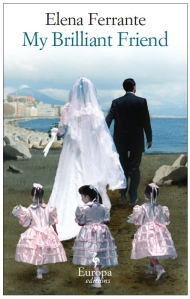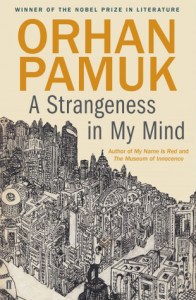 While adrift from the internet and with little time to read and review, I missed this literary event, which I’ll still mention as it’s one of the literary highlights of the year for readers of world and translated fiction like me.
While adrift from the internet and with little time to read and review, I missed this literary event, which I’ll still mention as it’s one of the literary highlights of the year for readers of world and translated fiction like me.
The prize is timely as it coincides with an increasing trend for reading translations, up 96% since 2001 though still only counting for 7% of fiction sold in the UK.
 The most popular literature languages translated into English in 2015 were French, Italian, Japanese, Swedish and German while the top-selling author was Elena Ferrante, with her all-consuming, Neapolitan series of four books: My Brilliant Friend, The Story of a New Name, Those Who Leave and Those Who Stay and The Story of the Lost Child.
The most popular literature languages translated into English in 2015 were French, Italian, Japanese, Swedish and German while the top-selling author was Elena Ferrante, with her all-consuming, Neapolitan series of four books: My Brilliant Friend, The Story of a New Name, Those Who Leave and Those Who Stay and The Story of the Lost Child.
So, from the Man Booker longlist of 13 books reviewed here, the six titles below made the shortlist for the Man Booker International Prize in 2016:
José Eduardo Agualusa (Angola) Daniel Hahn, A General Theory of Oblivion – On the eve of Angolan independence an agoraphobic woman bricks herself into her apartment for 30 years, living off vegetables and the pigeons she lures in with diamonds, burning her furniture and books to stay alive, writing her story on the apartment’s walls.
Elena Ferrante (Italy) Ann Goldstein, The Story of the Lost Child – book four in the Neapolitan saga of two friends, Lena and Lila, now adults, returning to their childhood town, dealing with life as mother’s, lovers, surviving an earthquake, tragedies of nature and humanity.
Han Kang (South Korea) Deborah Smith, The Vegetarian – Yeong-hye, seeking a more ‘plant-like’ existence, decides to become a vegetarian, prompted by grotesque recurring nightmares. In South Korea, where vegetarianism is almost unheard-of and societal mores are strictly obeyed, Yeong-hye’s decision is a shocking act of subversion.
As her rebellion manifests in ever more bizarre and frightening forms, Yeong-hye spirals further and further into her fantasies of abandoning her fleshly prison and becoming – impossibly, ecstatically – a tree. Fraught, disturbing, and beautiful, The Vegetarian is a novel about modern day South Korea, but also a novel about shame, desire, and our faltering attempts to understand others, from one imprisoned body to another.
Orhan Pamuk (Turkey) Ekin Oklap, A Strangeness in My Mind – the story of Mevlut, the woman to whom he wrote three years’ worth of love letters, and their life in Istanbul. Mevlut Karataş sells boza (a traditional mildly alcoholic Turkish drink) in Istanbul and wishes for love and riches. He doesn’t have the best of luck (falling in love with a woman and accidentally eloping with the sister) as he ages, attempts to discover what is missing from his life.
Robert Seethaler (Austria) Charlotte Collins, A Whole Life – Andreas lives his whole life in the Austrian Alps, arriving as a boy taken in by a farming family. A man of few words, when he falls in love with Marie, he has friends light her name at dusk across the mountain. When she dies in an avalanche, pregnant with their first child, Andreas’ heart is broken. He leaves the valley just once more, in WWII – and is taken prisoner in the Caucasus – returning to find modernity has reached his remote haven.
Yan Lianke (China) Carlos Rojas, The Four Books – In the ninety-ninth district of a sprawling labour camp, the Author, Musician, Scholar, Theologian and Technician are undergoing Re-education, to restore their revolutionary zeal and credentials. In charge of this process is the Child, who delights in draconian rules, monitoring behaviour and confiscating treasured books.
Divided into four narratives, echoing the four texts of Confucianism and the four Gospels of the New Testament, The Four Books tells the story of one of China’s most controversial periods, demonstrating the power of camaraderie, love and faith against oppression and the darkest possible odds.
And the Man Booker International 2016 winner was:
South Korean writer Han Kang’s The Vegetarian translated by Deborah Smith.

I haven’t read The Vegetarian, but was stunned by Han Kang’s Human Acts which I read earlier this year, and reviewed here. She is a remarkable writer and thinker and it’s brilliant that her work is being recognised and will find its way to a wider audience. I highly recommend reading her work, if you are interested in extraordinary minds trying to make sense of the most troubling aspects of humanity.
To purchase any of the above titles, click here:







Im really interested in reading these 3 authors…
LikeLiked by 1 person
I’ve read both Han Kang’s books now. I found both books remarkable, though had a slight preference for ‘Human Acts’. The quality of Deborah Smaih’s transaltion is quite something too, and I only recently found out that she only learnt Korean a few years ago.
LikeLiked by 1 person
Human Acts was amazing, I’m not sure if it was eligible for the prize this year, but as soon as I heard about it I had to read it, as you know. Interesting that had a preference for it too, has your daughter read them yet? Great that you’ve had the opportunity to read them before they became so popular too! I wonder what she will write next?
LikeLike
I’ll be in the queue when it appears. No, Emily hasn’t. Don’t know if they’re available in English language versions there. I’ll take my copies over!
LikeLiked by 1 person
I was on the bloggers shadow panel for the MBIP this year and thought it was a really strong shortlist. I think Human Acts is Han Kang’s most powerful novel but still very pleased that The Vegetarian won overall. I highly recommend The Four Books too.
LikeLike
Oh great thanks for reminding me, just went to check out the titles you shortlisted and great to see you came out with the same winner, second year in a row! Gives us added faith in the prize, since it’s big change this year.
LikeLiked by 1 person
I am yet to read The vegetarian. I cant wait with all the positive reviews going on.
LikeLiked by 1 person
I am intrigued to read it too, I’ve already read Human Acts which is quite something and I expect The Vegetarian to be quite different.
LikeLike
I have to admit that the Seethaler is the only one I’ve read on the shortlist but I absolutely adored it. A beautifully expressed (and translated), captivating novel about an unremarkable life.
LikeLiked by 1 person
I’d love to read that one for sure, a lot of the titles were novellas, making them even more tempting, particularly when I’m taking forever with the 700 + page Annie Proulx!
LikeLike
I’ve been following your Goodreads progress on Twitter with the Proulx. I think a quick surface for air would give you enough time for the Seethaler!
LikeLiked by 1 person
Yes, I’m suddenly attracted to the novella and planning a quick dip elsewhere!
LikeLiked by 1 person
The Man Booker short list always has its pull on me, so thanks for this update. I do, btw, have a non-Man Booker recommendation for you. Edna O’Brien’s ‘The Little Red Chairs.’ Profound and riveting, it really is a story of the times we live in.
LikeLiked by 1 person
This International prize has changed this year, it used to be every two years and an author was listed not a piece of work, now its combined with the IFFP, International Foreign Fiction Prize and will be an annual prize for a recently translated title. It’s a little sad to have lost the old prize, but this one may attract more readership perhaps.
Thank you for the recommendation, I’ll add it to my list.
LikeLike
Pingback: The Vegetarian by Han Kang tr. Deborah Smith #WITMonth – Word by Word
Pingback: Greek Lessons by Han Kang (Korea) tr. Deborah Smith + Emily Yae Won – Word by Word